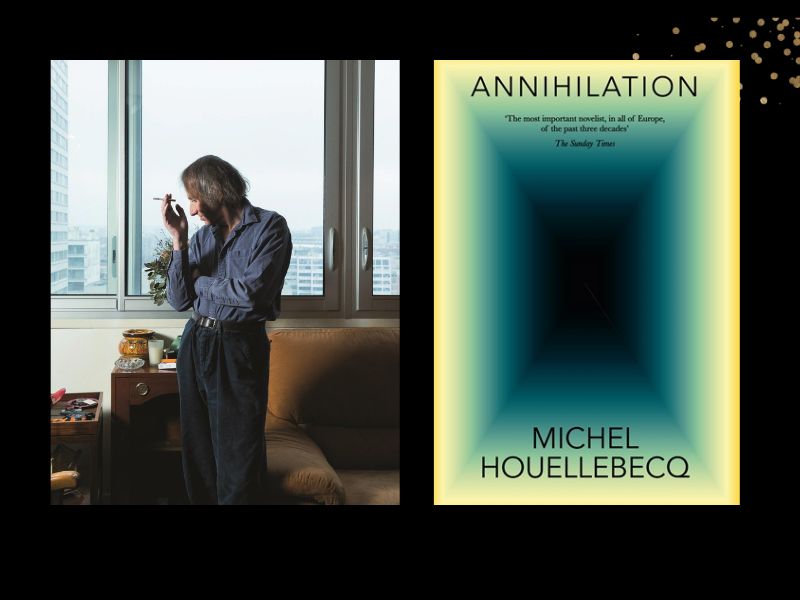In Michel Houellebecq’s Annihilation we witness humankind struggle with its claims to meaning, to self-empowerment, versus the random, yet conclusively destructive facts of life and death.
Set in France in the year 2027 during a national election, this sombre, almost bitterly depressive book is backgrounded by elements of a political thriller. However, it’s ultimately subsumed to elongated, often wandering existential meditations, provoked by confrontations with mortality that can seem to reduce mere politics to a trite, perverse joke.
A feel-good read it isn’t – and the novel’s disconsolate portrayal of confused individuals, stumbling, in various states of abandonment, through the void of modern capitalism, has unavoidably become more eerily apt, more perceptive, in the wake of the US election.
Heralded as the much-lauded Houellebecq’s ‘final novel’, Annihilation‘s grim fatalism is pervasive throughout, but modulated by moments of serenity and compassion for its ‘heroes’.
Our central protagonist is Paul Raison, an adviser to finance minister Bruno Juge, whose weary liberal government is bracing for the chaotic storm of a populist uprising as the election cycle winds into gear once again. This seems to escalate with a series of bizarre and mysterious cyberattacks, one of which casts Juge as the unwitting star of an ultra-realistic CGI representation of his execution.
But Houellebecq’s evocation of an all-too familiar sociopolitical world (which explicitly includes Marine Le Pen as political adversary – and, at least on the sidelines, Donald Trump), becomes secondary to traversing the domestic and private landscape of Paul’s life.
Already succumbing to the jaded ennui of a failing marriage, Paul’s life is given a jolting personal upheaval when his father Édouard suffers an almost fatally debilitating stroke. The near presence of death has a way of reawakening some spirit in this world – and it sets Paul on a pathway to kinds of reconciliation with his wife Prudence and other family members, including his estranged brother Aurélien.
Reflections on this personal crisis are conveyed with almost dazed, childlike sorrow for a lost innocence in the face of life’s cruelties, with a tendency toward almost stumbling sentences, punctuated with the odd injection of deliberate, ironic banality:
“[Paul] had always imagined the world as a place where he should not have been, but which he was in no hurry to leave, simply because it was the only one he knew. He should perhaps have been a tree, or a tortoise, perhaps, in any case, something less agitated than a human being, with an existence subject to fewer variations.”
Such ironically named ‘variations’ also include elections and the changing of governments – but politics here amount to cruelly self-defeating trivialities. Houellebecq does not take sides; instead we are privy to a sense of the greater failure of politics itself, its inability (and unwillingness) to provide real substance for its citizens.
The care facility, for example, supposedly rehabilitating Édouard, turns out to be a hellhole – full of patients mouldering in their bed sores – encapsulating the worst inclinations of cruelly cost-saving neoliberalism. It requires our heroes to break Paul’s father out of confinement, ironically with the aid of a right-wing activist group. But, even as the mission is a success, it comes with bitter ramifications for Maryse, a migrant worker at the facility, who helps them.
In this hopeless context, a misanthropy seems to leak out of the book’s characters, including Paul, extending to more generally cynical statements, delivered unequivocally.
“Women in general live their whole lives in the illusion of being intuitive and with a talent for lying, unlike men,” the narrator tells us at one stage, for example. “Sometimes it’s true, but less often than they think.”
Misogyny is also present in the representation of Aurélien’s wife, a grasping individual, variously described as a “slut” and a “venal piece of s**t” who “hates weakness” (and therefore hates Aurélien, who, for his part, dreams of murdering her). It’s tasteless and unpleasant – but arguably that’s the point: Houellebecq is petulantly, disgustedly, throwing the gross violence of our lives, unmoored from any greater significance, back in our faces.
Nevertheless, as Paul’s journey slowly progresses towards the end of the book, and a confrontation with his own mortality, Houellebecq alleviates his nihilism with a sincere compassion found in his portrayal of the laboured, sometimes awkwardly tender, reconciliation between him and his wife Prudence. Human connection and meaning can be found – if only, it seems, in the outer limits of suffering.
But Annihilation’s ultimate commitment to a grimly all-embracing vision makes it undoubtedly tough reading.
In the latter stages of the book, Paul finds solace – and some serene escape – in the works of Arthur Conan Doyle. Here, a sly, self-aware joke can perhaps be found in the way benign escapism amounts to a compelling alternative to the bleakness that Annihilation represents.
Read: 5 unexpected truths of being a published author
To be honest, at a time when we seem to be screaming headlong into the dying days of civilisation, there is something to be said for choosing lighter fare over 500 pages of implacably sour, sometimes obnoxious, existentialism. Still, backed by the fresh evidence of a real-world electoral outcome that aligns in so many respects with Houellebecq’s grey view, there seems little doubting its perceptiveness, and little real hope from just turning away.
Annihilation, Michel Houellebecq
Translated from the French by Shaun Whiteside
Publisher: Pan Macmillan
ISBN: 9781035026401
Format: Paperback
Pages: 544pp
Publication: 24 September 2024
RRP: $34.99





